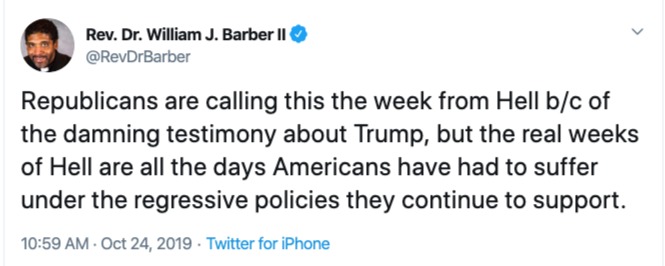Saturday in Whitewater will see occasional afternoon showers with a high of fifty-two. Sunrise is 7:22 AM and sunset 5:55 PM, for 10h 32m 51s of daytime. The moon is a waning crescent with 3.8% of its visible disk illuminated.
On this day in 1881, it’s a gunfight at the O.K. Corral.
Recommended for reading in full:
Philip Bump writes The U.S. deficit hit $984 billion in 2019, soaring during Trump era:
The U.S. government’s budget deficit ballooned to nearly $1 trillion in 2019, the Treasury Department announced Friday, as the United States’ fiscal imbalance widened for a fourth consecutive year despite a sustained run of economic growth. The deficit grew $205 billion, or 26 percent, in the past year.
The country’s worsening fiscal picture runs in sharp contrast to President Trump’s campaign promise to eliminate the federal debt within eight years. The deficit is up nearly 50 percent in the Trump era. Since taking office, Trump has endorsed big spending increases and steered most Republicans to abandon the deficit obsession they held during the Obama administration.
In 2011, the GOP-controlled House of Representatives pushed to pass a constitutional amendment that would require balanced budgets. And the Obama administration created a deficit commission looking for ways to slow the growth of government debt. But those efforts have fallen away, and budget experts believe the country will see trillion-dollar annual deficits far into the future.
Benjamin Wittes describes The Collapse of the President’s Defense:
President Trump’s substantive defense against the ongoing impeachment inquiry has crumbled entirely—not just eroded or weakened, but been flattened like a sandcastle hit with a large wave.
It was never a strong defense. After all, Trump himself released the smoking gun early in L’Affaire Ukrainienne when the White House published its memo of Trump’s call with Ukrainian President Volodymyr Zelensky. That document erased any question as to whether Trump had asked a foreign head of state to “investigate”—a euphemism for digging up dirt on—his political opponents. There was no longer any doubt that he had asked a foreign country to violate the civil liberties of American citizens by way of interfering in the coming presidential campaign. That much we have known for certain for weeks.
The clarity of the evidence did not stop the president’s allies from trying to fashion some semblance of defense. But the past few days of damaging testimony have stripped away the remaining fig leaves. There was no quid pro quo, we were told—except that it’s now clear that there was one. If there was a quid pro quo, we were told, it was the good kind of quid pro quo that happens all the time in foreign relations—except that, we now learn, it wasn’t that kind at all but the very corrupt kind instead. The Ukrainians didn’t even know that the president was holding up their military aid, we were told—except that, it turns out, they did know. And, the president said, it was all about anti-corruption. This was the most Orwellian inversion; describing such a corrupt demand as a request for an investigation of corruption is a bit like describing a speakeasy as an alcoholism treatment facility.




